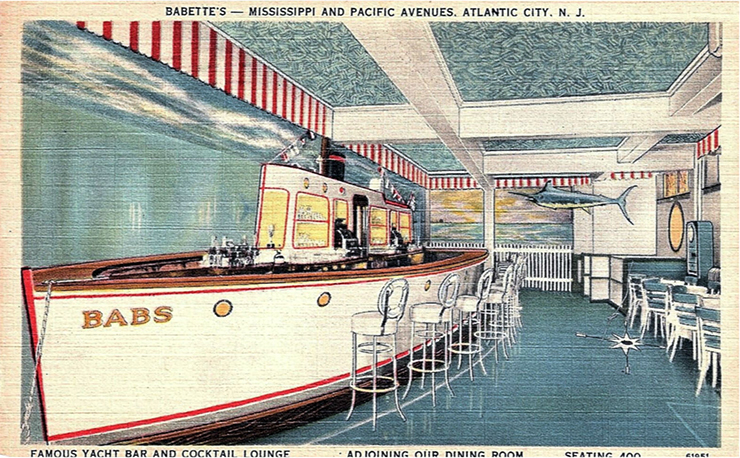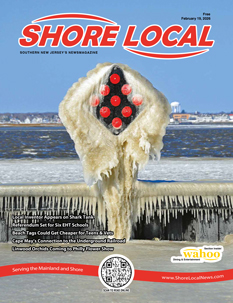By Bruce Klauber
It’s nearly forgotten now, but Babette’s, on 2211 Pacific Avenue, later the site of Trump Plaza, was one of the most popular and, at times, infamous nightspots and restaurants in Atlantic City from 1920 to 1950. Nelson Johnson, in his book, “Boardwalk Empire,” described it as “one of the most chic gambling casinos of that era, attracting patrons from around the country.” Johnson quoted a one-time customer, who said, “Only the very best people went to Babette’s. They had the best steaks and mixed drinks in town, and great entertainment.”
Babette’s was owned by Dan Stebbins and his wife Blanche Babette, a showgirl who became a wealthy and prominent member of Atlantic City society
If it’s remembered at all, it’s because Babette’s was featured in the popular television series that aired from 2010 to 2014, “Boardwalk Empire,” which chronicled the rough and ready, ultra-corrupt prohibition years in Atlantic City. Those who recall “Empire,” sadly not filmed in Atlantic City but on a Brooklyn, New York sound stage, might remember a number of party scenes that took place at the club, with the focal point often being on a character named “Nucky Thompson,” based on legendary Atlantic City political boss Nucky Johnson.
The actual history of Babette’s is as colorful as what was depicted on the television screen. Blanche Babette was born in Waynesburg, PA in 1888. In her latter teen years, she moved to Baltimore and began a career; say the history books, as a singer and a showgirl who worked in vaudeville and musical comedies. That may or may not be true, as there is no recorded evidence that Babette actually entertained on stage. She did, however, make an appearance in a 1917 silent film called “Hinton’s Double.” By all accounts, Babette only played a bit part in the movie, as existing casting sheets identify her part only as “child.”
Looking, perhaps, for more lucrative show business opportunities, she moved to Atlantic City in 1920. Opportunities come in various guises, and not long after her arrival at the shore, she took up with Daniel Stebbins, who was running a small club on Pacific Avenue called the Golden Inn. Stebbins and Babette married, and decided to expand the venue. Stebbins ran the business. Babette found her niche in show biz, as she ended up handling everything entertainment-related at the club, from designing costumes to emceeing.

Among those listed as appearing there through its years of operation from 1920 to 1950 were luminaries like Milton Berle, Rudy Vallee, Eleanor Powell, Joe Penner, and a pre-Beverly Hillbilly’s dancer and entertainer named Buddy Ebsen.
Comics, singers and dancers were not the only features at Babette’s. The club itself was evidently something to see. The décor was basically nautically themed, with the highlight being the bar that was built in the shape of a ship. And the food, mainly charcoal grilled steaks and seafood specialties, was said to be out of this world.
But the main attractions of Babette’s were liquor and gambling. Though prohibition lasted from 1920 through 1933, the booze flowed freely at Babette’s and in many other nightspots throughout Atlantic City. In line with illegal gambling, it’s been written many times through the years that there was actually more gambling in Atlantic City before gambling was officially legalized. Babette’s was one of the gambling centers of the city.
Three years after it’s opening, there was big trouble at the club. Though reports of actual events vary, what was eventually called “The Babette’s Supper Club bombing” did take place at the club in 1923. It’s been said that area crime family caporegime Gyp Rosetti was behind the bombing, which was actually an assassination attempt on competing organized crime bosses Nucky Thompson, Lucky Luciano, and Arnold Rothstein, all in the house on the night of the attempt. There were a number of injuries and several deaths, including Billie Kent, Nucky Thompson’s mistress.
One of the first Federal investigations of Babette’s took place in the late 1930s. Specifically, the Feds were looking at horse race betting. The most spectacular raid took place in 1943, when roulette wheels, craps tables and other gaming paraphernalia were seized by Sheriff James Carmack. The punishment, believe it or not, was a $5,000 fine.
There was another headline-making dustup at Babette’s that took place two years earlier. On January 24, 1941, the Vineland, NJ Journal newspaper reported the following: “Morris ‘Mush’ Zatlin, 28, resort underworld character sought for 21 months in the shooting of Dan Stebbins, sportsman and café proprietor in Atlantic City, surrendered yesterday to Prosecutor Harry R. Coulomb. Taken to the Atlantic City jail at Mays Landing, Zatlin was held on charges of assault with intent to kill and illegal possession of weapons. He was indicted on both counts in 1939. Stebbins was shot and slightly wounded while in the bar.”
Despite the incidents, the violence and the notoriety, business thrived at Babette’s, but by 1950, things had changed in Atlantic City. There were more nightclubs, more restaurants, other spots that had gaming in the back room, including the 500 Club, which was a major and much more hip competitor. In 1950, Blanche and Dan sold the property. It reopened as the Yacht Club, which stood until February of 1955, when the club was demolished. The property was home to several other venues, as well as a 40-unit motel, until Trump Plaza was built in 1984. On February 17, 2021, after sitting vacant since 2014, the Plaza became the second boardwalk hotel/casino to be imploded. The Sands was the first, in 2007.
The Stebbins lived in relatively quiet retirement after the sale. Dan Stebbins died in 1960 and Blanche three years later. They didn’t live to see what Atlantic City had become, but given their wild and wooly experiences during 30 years at Babette’s, they likely would not be surprised.













